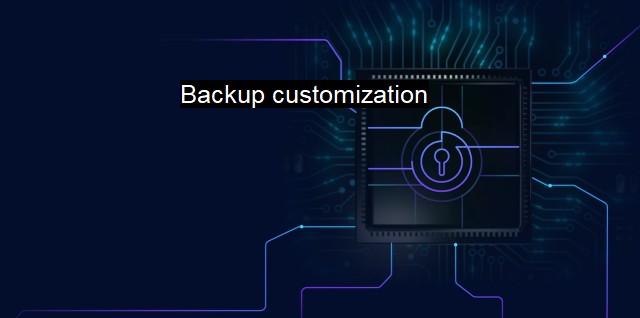What is Backup customization?
Backup Customization: Tailoring Your Antivirus Solution to Your Unique Cybersecurity Needs
Backup customization refers to the practice of designing and implementing data backup systems that are adapted to meeting the specific needs of an organization. In the context of cybersecurity and antiviruses, backup customization plays a vital role as it not only guarantees data safety but strengthens data management as well as cover gaps left by other cybersecurity and antivirus configurations.To comprehend the underlying importance of backup customization it is essential to first recognize that cybersecurity threats are wide-ranging and can become sophisticated over time. Viruses, ransomware, phishing threats, and data breaches can ravage systems, compromising vital data, and sometimes rendering them irretrievable. To counter these threats, organizations often adopt both reactive and proactive measures. Proactive measures involve using antiviruses and other cybersecurity tools to prevent an attack, while reactive measures deal with restoring normalcy after an attack, one of which is using a data backup.
Backup customization is designed within the structure of these reactive measures. Backup customization ensures that backed-up data is retrievably organized. This ordering eliminates situations that could emanate from a full data retrieval when a user may only need part of the data. Customization can be designed as per the requirements of the user – you can select particular files, directories, or databases you want to back up at different timestamps to ensure easy retrieval.
While cybersecurity systems aim at dealing with external threats, they may not always succeed in shielding off every potential threat, often resulting in a compromise. When this happens, the need to revert to a safer state of data, which a dependable backup provides, comes up. antivirus defenses may not provide full protection against certain malware or other malicious programs that specifically target data. To cater to gaps like these, customized backup systems swing into action.
In the broader view, customization allows both differential and incremental backups. Notably, differential backups ensure that all data changes that have occurred since the last full back up are recorded, while incremental backups record data changes that happened since the last backup regardless of the type. Backup customization also permits for performing specific types of backup which includes full backup, differential backup, and incremental backup.
Also, customization ensures each backup is independent and can be used independently depending on the user’s needs. An effectively customized backup allows individual data restoration without affecting the system. On the other hand, poorly customized backups do not account for future needs, which might necessitate re-establishment costs.
Data is an essential asset to any organization. Losing data not only marks a security compromise but also poses a threat to the organization’s functioning and continuity. An organization, therefore, has to oversee the protection of its data. One primary way of ensuring data safety is having a practice that would guarantee seamless data retrieval in case of a compromise. Backup customization serves this purpose while offering flexibility where standard backing up systems do not.
Backup customization is an essential aspect of data management and security. It offers an organization a chance to dictate what, when, and how data should be backed up according to individual organizational needs. Despite the other existing security measures, standard backup practices cannot always handle sophisticated security breaches and as such, the importance of those customization features cannot be overstressed. As cyber threats morph into new forms and sophistication, so should our response to them, including having robust, flexible, customized backup systems to cover the explosively evolving perimeters of the cybersec world.

Backup customization FAQs
What is backup customization in cybersecurity and antivirus?
Backup customization is the process of configuring backup settings according to specific security requirements. This includes selecting which files, folders, or applications should be backed up, scheduling backups, choosing backup destination, and setting backup frequency.Why is backup customization important in cybersecurity and antivirus?
Backup customization is crucial in cybersecurity and antivirus because it helps prevent data loss or corruption due to cyberattacks, hardware failure, or system errors. A well-designed backup plan can minimize the impact of security incidents, ensuring business continuity and reducing recovery time.What are some best practices for backup customization in cybersecurity and antivirus?
Some best practices for backup customization in cybersecurity and antivirus include performing regular backups, storing backups in a secure offsite location, encrypting backups, testing backups to ensure their integrity, and using multiple backup sets to provide redundancy. It's also important to update backup settings as needed to reflect changes in the IT infrastructure or security threats.How can I customize backup settings in my antivirus software?
To customize backup settings in an antivirus software, look for the backup or data protection options in the program settings. Depending on the software, you may be able to select which files or folders to backup, set backup frequency, specify backup destination, and configure encryption settings. Make sure that the backup settings align with your cybersecurity requirements and backup policies.| | A | | | B | | | C | | | D | | | E | | | F | | | G | | | H | | | I | | | J | | | K | | | L | | | M | |
| | N | | | O | | | P | | | Q | | | R | | | S | | | T | | | U | | | V | | | W | | | X | | | Y | | | Z | |
| | 1 | | | 2 | | | 3 | | | 4 | | | 7 | | | 8 | | |||||||